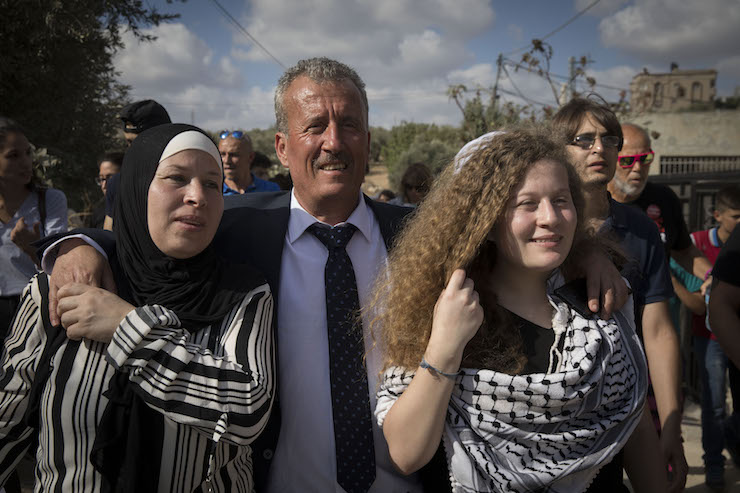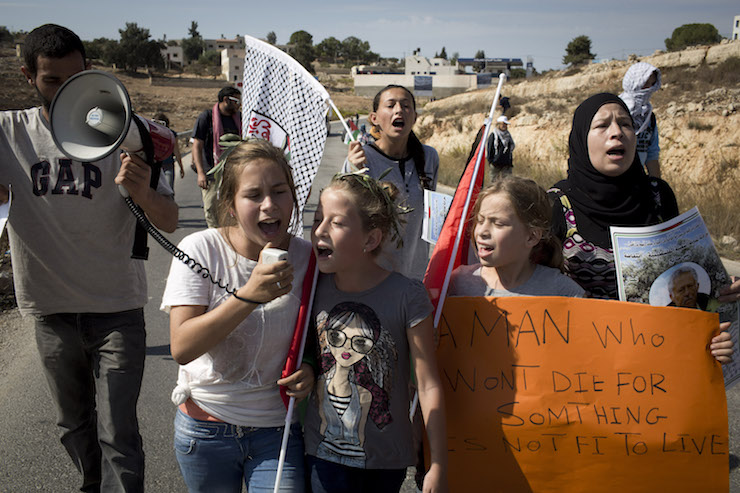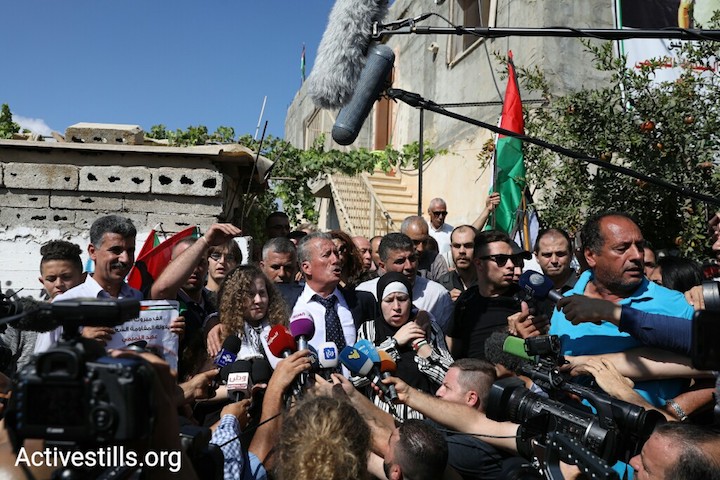Eight months after she was sent to prison for filming her daughter slap an IDF soldier, Nariman Tamimi speaks about her time behind bars, the case for international pressure on Israel, and the way her family is treated by the Israeli media. ‘They know that Ahed is not a terrorist. If we wanted to be terrorists, we would be the exact opposite of who we are.’
By Oren Ziv

A day after Ahed and Nariman Tamimi’s release from prison on Sunday, media outlets, friends, and activists continued to flood the family in the West Bank village of Nabi Saleh. Despite a decision not to permit one-on-one interviews, since Tuesday morning reporters from major international media outlets have stood in a giant tent outside the home, waiting to interview Ahed.
The questions have been nearly identical: how was prison? How does it feel to come home? What is your message to the Palestinian people? What are your plans for the future? Yet very few have shown interest in Ahed’s mother, Nariman, who was arrested hours after her daughter, and who also spent eight months in prison. On Sunday the two were released, but not before they were held for hours in a Israel Prison Service facility and then an IDF jeep, where they had their eyes covered until they were finally set free at the entrance to their village. I was the first to interview Nariman following her release.
On the day of their arrest, as Ahed and her cousin Nur confronted the IDF soldiers who entered the Tamimi family’s yard, Nariman decided to turn on the camera and live stream the incident on Facebook. “I began broadcasting so that everyone can see what happened here,” Nariman says as we sit in her yard. Between questions she gets up to welcome the guests who continue to stream in at all hours of the day.
“If you take a regular video, people will say it is staged, that it’s a lie. But when it happens live it is reality,” she adds. When I ask her about the prosecution’s claim that the live stream was meant to urge more people to come confront soldiers, she says that Nabi Saleh is so small that there is “no need for live broadcasts to let people know that the army has invaded the village.”
I first met Nariman in 2009, when the villagers of Nabi Saleh began demonstrating against the takeover of their spring by the settlers of nearby Halamish. Nariman and her husband Bassem were among the organizers of the protests; their children — including Ahed — took part as well, a decision that has led to criticism. “The soldiers invade the houses and streets during the day and night anyway, so at least the children don’t have wait at home in fear,” she told me back then. Nariman, who leads the weekly marches from the village to the spring, is one of the most determined activists I have ever met in the West Bank. Her various arrests (four in total), the incitement against her family, the death of her brother Rushdi — who was shot and killed by Israeli soldiers in 2012 — have not stopped her from resisting the occupation.

“This wasn’t the first time I used Facebook Live,” she says, “but I never thought it would turn into such a big story.” The incident took place on a Friday, but Ahed was only arrested four days later — following pressure by the Israeli Right — by soldiers equipped with cameras. Nariman herself was arrested a few hours later as she arrived at the Sha’ar Binyamin police station. “They arrested Ahed at 3 a.m., I was arrested later that day. I didn’t see a thing on the news and I knew nothing. Our phones were with the police. Only when I came to the court (for her remand extension – O.Z.) and saw many people did I understand that this became a big deal.”
In jail, Nariman was horrified to discover that her family was being described as terrorists by the Israeli media. On Sunday, hours after they were released from prison, the Tamimi family held a press conference during which Ahed said that she would refuse to give interviews to Israeli news outlets, following the hostile coverage toward her family since the arrests. “After the arrests, there was a report on Jana (Ahed’s family member, who many have called ‘the youngest journalist in the world,’ and who reports from the village – O.Z.). The people in the studio called her ‘the second Ahed Tamimi’ and said that we raise terrorists without giving us the right to present our side. So why should I speak to them?” Ahed said during the press conference.
Until they signed their respective plea bargains in March, Ahed and Nariman’s trials were held at Ofer Military Court in the West Bank. In the meantime, they were held at the security wing for women at Hasharon Prison. As part of the plea bargain, Nariman was convicted of incitement. “Every single thing I publish on social media can be considered incitement,” she says, “they printed out a copy of my Facebook profile picture after I changed it to a photo of Rushdi.”
Since their release, Ahed and Nariman have been speaking out about the situation of Palestinian women in Israeli prisons. “The occupation treats men and women the same in prison. There is a head count in the morning, and at 10:30 we are allowed to walk around the ward for an hour. After that we are put back in our rooms until 2:30 when we are allowed to walk around until five,” Nariman tells me. Her room was built to hold four, although at times up to six women were living in her room, forcing some to sleep on mattresses on the floor. “The room was very small. We cooked together on an electric stove, and every two or three weeks we would have a large dinner for all the women.”

In prison, Nariman took advantage of her time and studied alongside Ahed for the Palestinian matriculation exam. Now, after their release and with a matriculation certificate in hand, Nariman intends to study at university. “In prison they tried to close our classroom,” she says, “but the prisoners’ spokeswoman told those in charge that we will continue to study no matter what.” The issue reached the warden, who permitted the women to continue studying.
Nariman is well aware of her family’s image in the Israeli mainstream, yet she insists on passing on a message to the public on the other side of the wall. “I say to everyone, use your head and search for the truth. You’ll be able to find it. They know that Ahed is not a terrorist. If we wanted to be terrorists, we would be the exact opposite of who we are. It is easy to be a terrorist or a murderer, it is much harder to pursue peace,” she says emphatically, “if I were a terrorist, I wouldn’t be able to talk to you, but I consider you my friend and my brother.”
She then turns to the international community, to whom she wants to send a different message: “The international community must do for the Palestinian struggle what it did for the Israelis and the Jews after the Holocaust when they were given a state that wasn’t theirs. Now it is time to return the land to the people to whom it belongs. You (the international community – O.Z.) brought these people here and created the hostility between us. Now you must put an end to it. Just like in South Africa when there was first international pressure followed by a solution. We need international pressure.”
This article was first published in Hebrew on Local Call. Read it here.


